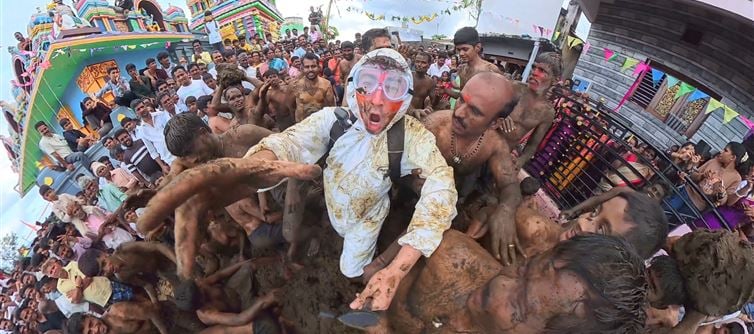
🧨 When diwali Ends, the Dung Begins
The Astonishing Ritual That Turns a village Into a Battlefield of Faith
Every year, a day after Diwali’s lights fade, the small village of Gumatapura in Karnataka transforms into something unimaginable. Forget fireworks, sweets, or oil lamps — this is where people fling cow dung at each other in a wild frenzy of devotion, laughter, and chaos.
This isn’t madness. It’s Gore Habba — a century-old ritual that locals believe washes away evil, brings good health, and ushers in good fortune.
For the people of Gumatapura, cow dung isn’t dirt. It’s divine. And during this festival, it’s a weapon of purification.
💩 The “Holy Mess” Begins
On the morning after diwali, villagers collect heaps of fresh cow dung, piling it high in front of the Sri Beereshwara Temple — the heart of the village and the epicenter of the Gore Habba ritual.
After prayers, drums begin to thunder. The air fills with chants. Then suddenly, a sacred chaos erupts.
Men, women, and children scoop up handfuls of dung and launch them through the air. What follows is a spectacle that feels equal parts surreal and spiritual — a battlefield of faith, where no one escapes the “blessing.”
To outsiders, it looks shocking. To the locals, it’s cleansing.
🌿 Dung, Divinity, and Deep Belief
In Hindu tradition, the cow is sacred — a symbol of purity and nourishment. Its dung, far from being waste, is used in homes for rituals, fuel, and even natural disinfectants.
The Gore Habba pushes this belief to its most extreme form. For villagers, getting hit by cow dung isn’t disgusting — it’s auspicious. “It keeps diseases away,” they say. “It brings luck, it purifies the soul.”
No masks, no disgust — just faith that what the rest of the world calls filth is actually God’s own gift.
🎥 When the West Met the Mess: Tyler Oliveira Joins In
When American YouTuber Tyler Oliveira decided to attend the festival and film it, his video instantly went viral. The sight of a foreigner ducking, laughing, and getting plastered in cow dung drew millions of curious eyes.
For some, it was hilarious. For others, shocking.
But for india, it was another moment when the West’s disbelief collided with India’s deep, ancient faith.
Tyler called it “a poop-throwing festival.” The locals call it “a holy ritual.”
Two worlds, one pile of dung — and a clash of perceptions that says more about cultural difference than about the ritual itself.
⚡ Faith, Filth, or Fascination?
It’s easy to mock what we don’t understand. But festivals like Gore Habba are reminders that tradition isn’t about logic — it’s about legacy.
For Gumatapura’s villagers, this ritual is not a spectacle for the world — it’s survival of culture, passed down for generations. The dung dries, the laughter fades, and life returns to normal. But for one day, the village becomes a living symbol of India’s contradictions — sacred and messy, chaotic and pure, filthy yet divine.
🔥 Final Thoughts: What the World Sees vs What india Believes
To a camera lens, Gore Habba might look like madness.
To those who live it, it’s faith in motion — earthy, raw, unapologetic.
Because in Gumatapura, when the world turns away in disgust, they turn to the heavens and whisper a single truth:
“Where there is dung, there is divinity.”




 click and follow Indiaherald WhatsApp channel
click and follow Indiaherald WhatsApp channel